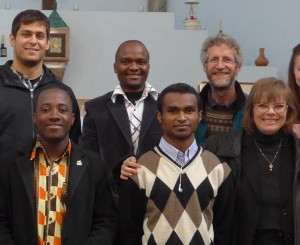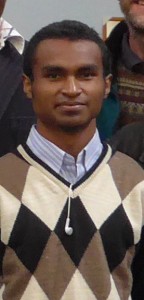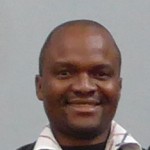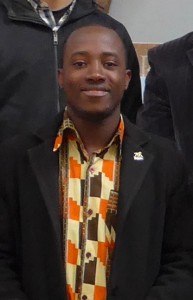The Comité d’Entre-aide Internationale (CEI) is one of the organizations on the front-lines of work with migrant communities in Morocco, and in Oujda, there are four young exchange students from sub-Saharan African countries who are doing most of the work for CEI. In the photo below, you can see Ruben from Angola in the back row, Theophilus from Ghana and Héry from Madagascar in the front row. I think Héry and Ruben are both doing degrees in engineering; Theophilus is doing a degree in geo-science, hoping to help manage new oil deposits found in Ghana. Héry plans to return to Madagascar to help build new buildings for the developing civil society there.

Azariash from Mozambique, working on a degree in international law, is not in the photo, which was taken at the Christian church service Sunday morning; Azariash was absent, trying to arrange care for a migrant who had been knifed in the neck overnight.
After our day of visiting the camps, we took the CEI team out to dinner and asked them about their experiences: what’s difficult for them in this work, what makes them do it.

Héry, who I think is in charge of the project overall, was pleased that we had had some experience of how complicated and challenging the work can be: the struggle to be equitable in distribution, often displeasing the people you are trying so hard to help.

Ruben had been involved with the project when he first arrived in Oujda, but he had spent a year or two away from it. He had been in charge of preparing and delivering food to migrants. One day he saw a man looking at the sandwich he had just given him with disgust. Then the man saw Ruben looking at him: he threw the sandwich in Ruben’s face. “I was so mad,” Ruben told us. “I thought, ‘Do you have any idea how long it took to make these sandwiches? Do you know I’m a student? I don’t have the time to be doing this.’ So I quit. I didn’t need to be treated that way.”
“But you came back,” we said. “Why?”
“I couldn’t stop thinking about it,” Ruben said. “It’s not right, what these people suffer. But the work is not easy.”
Azariash was completely focused on the work: the difficulties he named were all focused on the need for more resources to help the migrants. Azariash thinks CEI should accept any volunteers who want to help, Christian or not. He has friends who are doctors and he’s persuaded them to provide medical help to the migrants. He speaks across the table to Héry about broadening the base of support for the migrants, which makes it look as if Héry disagrees. Azariash also wants to spread the word back in the home countries of these migrants. He insists that he is learning so much, he receives more than he gives. At the same time, he too acknowledges the difficulty of the work, especially recently, with the death of El Hajj.

I didn’t hear much of what Theophilus said, because Jeremy was running back and forth to the bathroom the whole time. But even before we came, we knew that Theophilus as a Ghanaian felt personally threatened by the murder of his countryman, El Hajj, and that he had been friends with El Hajj and mourned his death intensely. “Nigerians killed El Hajj; I am not ready to go back into the forest and work with the Nigerians.” Azariash shared many of these feelings: he and Theophilus intentionally led the group going to the university today, while Héry and Ruben led those of us who went into the forest.
The words that stay with me most strongly from the evening are Héry’s. When Karen pressed him again to say why he did this work, he replied: “Nous ne sommes pas dignes de nos avantages: We are not worthy of our advantages. We didn’t do anything to earn them. This work makes us ask, ‘Why do we have so much and these people so little? How can this be just? And what can we do about it?'”
Questions for us all.